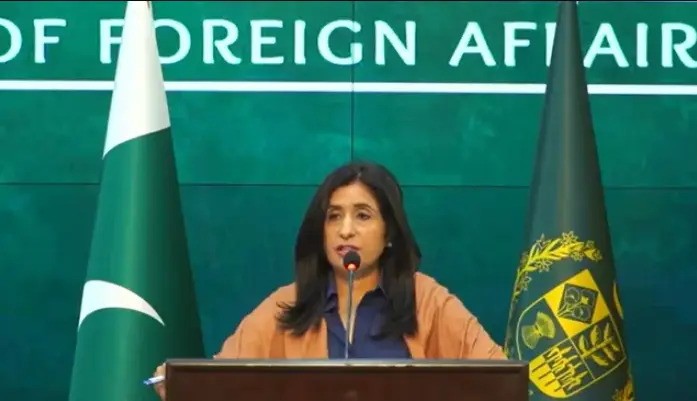Pakistan expressed deep concerns over Israel’s recent large-scale military operation, on Thursday in the occupied West Bank. During her weekly press briefing in Islamabad, Foreign Office Spokesperson Mumtaz Zahra Baloch condemned the attack. She described it as a flagrant violation of international law, including the 4th Geneva Convention, which prohibits the indiscriminate targeting of civilians.
Israel’s attack, launched on Wednesday, resulted in the deaths of at least 11 Palestinians in the West Bank. Among the victims were children, according to the United Nations. Hamas reported that three members of its armed wing were killed in the Jenin refugee camp. Baloch reiterated Pakistan’s stance, calling for immediate action from the United Nations Security Council (UNSC). She urged the UNSC to halt the ongoing genocide of the Palestinian people, stop Israel’s blatant breaches of international law and the UN Charter, and hold it accountable for war crimes.
Condemnation of Cultural Attacks
Baloch also strongly denounced the bombing of the historic Grand Mosque in Khan Younis by Israeli forces. She described the attack on a site of significant cultural and religious value as a clear breach of international laws, including the Hague Convention. She further condemned Israel’s repeated use of force, including airstrikes and drone attacks on civilian areas, as violations of international humanitarian law.
Read More: All Schools to Remain Closed, Heavy Rainfall and Cyclone Warning
Diplomatic Engagements and Regional Issues
In addition to condemning Israeli actions, Baloch highlighted Pakistan’s recent diplomatic activities. She mentioned Foreign Secretary Muhammad Syrus Sajjad Qazi’s visit to Cameroon, where he led the Pakistani delegation at the 50th session of the OIC Council of Foreign Ministers (CFMs). During the session, Qazi shared Pakistan’s views on the ongoing genocide in Gaza, the severe humanitarian crisis, and Israeli actions that threaten regional peace. He also addressed other key issues, including the atrocities in Indian-occupied Jammu and Kashmir, rising Islamophobia, and the impacts of climate change.
SCO Meeting and Relations with India
Baloch also mentioned that Pakistan has extended invitations to the heads of government of all Shanghai Cooperation Organisation (SCO) member states, including the Indian Prime Minister, for the upcoming Council of Heads of Government meeting. The meeting will be hosted by Pakistan on October 15-16.
In response to a question, Baloch denied any trade relations between Pakistan and India. She emphasized that Jammu and Kashmir is internationally recognized as a disputed territory and reiterated that any resolution must reflect the will of the Kashmiri people through a UN-supervised plebiscite.
Stance on TTP and CPEC
Addressing questions about the Tehrik-i-Taliban Pakistan (TTP), Baloch stated that Islamabad has no plans to engage in talks with the banned group. She confirmed that the presence of terror groups, including the TTP, in Afghanistan has been corroborated by multiple international reports, including those from the United Nations. Pakistan expects Afghan authorities to take decisive action against these groups to ensure Pakistan’s security.
Regarding the China-Pakistan Economic Corridor (CPEC), Baloch described it as a transformative project that has significantly contributed to Pakistan’s national development. She clarified that Pakistan’s debt related to CPEC projects constitutes only a small portion of the country’s total debt, with loans from China having longer maturity periods and low-interest rates. Baloch reaffirmed Pakistan’s commitment to ensuring the security of all Chinese nationals, projects, and institutions in the country.
Follow us on Instagram, YouTube, Facebook, Whats App, and TikTok for latest updates.
